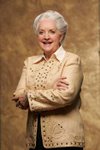I have been thinking a lot about my grandchildren and what I want them to know to help them grow through life. I found a number of wonderful biographical books by famous authors that illustrate many desirable virtues, but not all my grandchildren are avid readers. What I was really looking for was something as succinct, memorable and profound as the advice above, which was given to me by my late great-uncle John Henry Hampton when I was about 10-years old.
John Henry was one of my most influential role models. But other than that one little gem of wisdom, anything I learned about life from my uncle came from spending time with him. I knew from my parents that he had overcome early struggles and emotional heartache and carved out a successful life. His second wife was a woman with three young daughters, and he had lovingly reared them to adulthood. They adored him.
When I was first invited for overnight visits to their home in St. Louis, two of the girls were in college, but still living at home, and one was a senior in high school. I noticed that a light-hearted and good-natured banter went back and forth between them all the time. The ensuing laughter was infectious. John Henry was often the butt of the humor and he took great pleasure in this and was able to easily laugh at himself.
At that stage of my life, I don’t remember being overly impressed with anything else about their home life – except the fact that John Henry had a number of books in his bathroom – and the time he spent there was accorded an exceptionally high level of respect. Being a voracious reader, I couldn’t wait to find out what was in his “library.” I was surprised to find that his entire collection consisted of Western novels.
I realize now that what he also had was an uncommon amount of common sense and a firm grasp of what was important in life. Although I thought back then that he was rich, he wasn’t, at least not financially. Actually, he was a tool-and-die maker at Carter’s Carburetor and content with his chosen career and his life. The fact that his wife worked undoubtedly added to their discretionary income.
The family also owned a fine old stone house near Black river in the beautiful Missouri Ozarks. After their daughters were married, it was my pleasure to accompany John Henry and Aunt Leatha there each summer. I played with the local kids, swam in the river and rode horses. But the time I treasured most was that spent alone with John Henry.
As soon as we were in the “country,” as he called it, he took on the persona of a farmer, which he wasn’t, and a country singer, which he also wasn’t. This included wearing overalls and tending a small garden. At least once a week we would pile into his old pickup truck, which he loved, and visit all the neighboring farmers and the country store. Between stops he would be singing at the top of his lungs such classics as “The Wabash Cannonball,” and “I’ll Jes Take an Old Cold Tater and Wait.” I’m not sure he didn’t make up the last one.
As we visited the local farms, I got the impression that this was John Henry’s circuit and he was making sure everyone was all right. I soon learned from the conversations that his generosity extended far beyond our family. The high esteem in which he was held was evident wherever we went. He had a strong sense of self and despite his overalls there was a natural elegance in his manner and a child-like playfulness about him that drew people like a magnet. I was honored and proud to be his great-niece.
In the nearby town of Redford, there were no telephones, a post office, two churches and a one-room schoolhouse. In “Mr. Brooks’ store,” there were always barrels of crackers, pickles and nuts, as well as anything else that might be needed by the locals. And sitting cozily in the middle near an old wood stove would be half a dozen overall-suited farmers. It was as if they knew John Henry was in town, and were just waiting for him to show up, which he always did. When we drove in, they stood up in unison, started smiling, walked outside and warmly greeted John Henry.
The expectancy was palpable, and John Henry didn’t disappoint them. I watched proudly from the porch, seated in an old rocker and sipping a cold bottle of chocolate soda, a gift from the store’s owner.
John Henry updated them on the news that was gathered on our visits to neighboring farms, and offered some insights on local issues that were of special interest to them. At times his humorous commentary brought forth gentle laughter.
I have always been grateful for John Henry Hampton’s loving and joyful presence in my life. I wish my children and grandchildren could have known him.
He never strayed from the truth. He was a giver instead of a taker and a hard worker who never expected anyone else to do his share. To be around him was to be embraced in joy, love and respect. I learned that when I love and respect myself, I love and respect others, therefore I do not lie, I do not steal and I am not lazy—and I live a good and happy life.
_________________________________
Copyright 2008 by Fern Stewart Welch
The author’s book THE HEART KNOWS THE WAY—How to Follow Your Heart to a Conscious Connection with the Divine Spirit Within is available at Amazon.com and other online booksellers, as well as through major bookstores such as Barnes & Noble and Borders.
Subscribe to:
Post Comments (Atom)


No comments:
Post a Comment